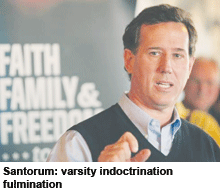Higher education has become the latest battlefield in the polarising campaign among Republicans vying to challenge Barack Obama after one candidate branded the president “a snob” for suggesting that more Americans should go to university.
“There are good, decent men and women who go out and work hard every day and put their skills to the test that aren’t taught by some liberal college professor that (tries) to indoctrinate them,” declared US senator Rick Santorum. He previously said that universities’ “radical secular ideology” strips students of their religious faith. “The indoctrination that occurs in American universities is one of the keys to the Left holding and maintaining power in America,” he added.
 But while such pronouncements have won tentative applause from ardently conservative supporters, observers doubt they will resonate with many voters. Polls by the San Jose-based Higher Education Policy Institute (Hepi) show 60 percent of Americans consider a university degree essential to succeeding in the job market, up from 30 percent just 10 years ago.
But while such pronouncements have won tentative applause from ardently conservative supporters, observers doubt they will resonate with many voters. Polls by the San Jose-based Higher Education Policy Institute (Hepi) show 60 percent of Americans consider a university degree essential to succeeding in the job market, up from 30 percent just 10 years ago.
Pundits have also gleefully observed that Santorum has an undergraduate degree and a law degree from Pennsylvania State University and a Masters in business administration from the University of Pittsburgh. Indeed, he is part of a field that may be among the most educated ever to run for president.
The current Republican frontrunner, former Massachusetts governor Mitt Romney (an alumnus of Brigham Young University who has two advanced degrees from Harvard University) would address the shortage of Americans with maths, science and engineering skills by granting permanent residence to foreign-born graduates with advanced degrees in those fields from US institutions.
Meanwhile Santorum’s suggestion that expecting everyone to go to college is elitist seems to be making little headway. “Politically, in all my years I never heard anybody run for office say: ‘I’m going to make this...a better place by having fewer people go to college,’” says Pat Callan, the president of Hepi.
(Excerpted and adapted from Times Higher Education)